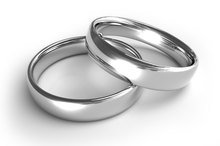What Is the Difference Between Reiki & Quantum Touch Therapy?
Quantum Touch is a system of alternative healing based on a life energy known as "ki." It was created by Richard Gordon based on a combination of various healing techniques such as Chinese Qi Gong 1. Reiki is also a system of healing based on life energy, but it is a different system. It was created by Dr. Mikao Usui in Japan, based on a spiritual revelation he believed himself to have experienced.
If you are experiencing serious medical symptoms, seek emergency treatment immediately.
Reiki
Reiki is purported to be a type of energy that comes from God. The Japanese word "rei" means a wisdom that comes from God or the divine, while the word "ki" means the energy of life. Reiki energy is not simply the same thing as ki energy -- believers in Reiki consider it to be a particular type of ki energy that is divinely guided. Even if another system of energy healing such as Quantum Touch is also based on ki, it may not be based on Reiki specifically 1.
- Reiki is purported to be a type of energy that comes from God.
- Reiki energy is not simply the same thing as ki energy -- believers in Reiki consider it to be a particular type of ki energy that is divinely guided.
How Reiki Works
Reiki Side Effects
Learn More
Reiki healing is not a skill than can be taught by one person to another. Instead, the ability to access the Reiki energy is supposed to be given by one person to another through a process known as attunement. The attuned person is then supposed to be able to call down the Reiki energy to heal others by moving his hands in certain patterns over the afflicted person. This process is supposed to allow the divine energy to heal the person receiving treatment without draining any life energy from the person giving the treatment.
- Reiki healing is not a skill than can be taught by one person to another.
- The attuned person is then supposed to be able to call down the Reiki energy to heal others by moving his hands in certain patterns over the afflicted person.
Quantum Touch
Quantum Touch is not seen as a power that can be given by one practitioner to another like Reiki 1. Instead, it is a trained skill -- a system of meditations, methods for being more aware of the body, and patterns of breathing. This system is supposed to give the practitioner the ability to focus and control the life energy into an optimal state. The healer then attempts to bring the client's life energy into the same state so that client can heal herself. The actual practice of Quantum Touch involves passing the hands over the person receiving the healing, as in Reiki 1. However, the Reiki healer is considered a channel or conduit of the energy, while the Quantum Touch healer is seen as having a more active role 1.
Comparing Reiki and Quantum Touch
Differences Between Shiatsu & Swedish Massage
Learn More
Practitioners of Quantum Touch therapy sometimes claim that their method is much faster than Reiki, that it produces much more dramatic results or that it is a breakthrough in comparison to Reiki 1. However, practitioners of both systems make dramatic claims that have not been proven or supported by scientific research. The existence of any kind of life energy such as "ki" is a matter of personal spiritual belief rather than proven medical fact. Neither system should be used in place of proper medical treatment, although either system can be used to complement medical treatment depending on your own views.
- Practitioners of Quantum Touch therapy sometimes claim that their method is much faster than Reiki, that it produces much more dramatic results or that it is a breakthrough in comparison to Reiki 1.
- Neither system should be used in place of proper medical treatment, although either system can be used to complement medical treatment depending on your own views.
Related Articles
References
- Local Healers: Quantum Touch
- The International Center for Reiki Training: What Is Reiki?
- Pohl M, Szabo FJ, Shiode D, Hunter R. Pain Recovery: How to Find Balance and Reduce Suffering from Chronic Pain. Las Vegas, Nevada: Central Recovery Press; 2009.
- Rand WE. An Evidence-Based History of Reiki. Southfield, Michigan; ICRT Publishing September 3, 2015.
- McManus DE. Reiki is better than placebo and has broad potential as a complementary health therapy. J Evid Based Complementary Altern Med. 2017;22(4):1051-7. doi:10.1177/2156587217728644
- Singg S. Use of Reiki as a biofield therapy: An adjunct to conventional medical care. Open Access Text. 2015:1(3):54-60. doi:10.15761/CCRR.1000121
- Joyce J, Herbison GP. Reiki for depression and anxiety. Cochrane Database Syst Rev. 2015;(4):CD006833. doi:10.1002/14651858.CD006833.pub2
- Thrane S, Cohen SM. Effect of Reiki therapy on pain and anxiety in adults: an in-depth literature review of randomized trials with effect size calculations. Pain Manag Nurs. 2014;15(4):897-908. doi:10.1016/j.pmn.2013.07.008
- Powers L. Reiki: Level I, II and Master Manual (1st Edition). Scotts Valley, California; CreateSpace Independent Publishing Platform; 2016.
- Radin D, Schlitz M, Baur C. Distant healing intention therapies: An overview of the scientific evidence. Glob Adv Health Med. 2015;4(Suppl):67-71. doi:10.7453/gahmj.2015.012.suppl
Resources
Writer Bio
Scott Thompson has been writing professionally since 1990, beginning with the "Pequawket Valley News." He is the author of nine published books on topics such as history, martial arts, poetry and fantasy fiction. His work has also appeared in "Talebones" magazine and the "Strange Pleasures" anthology.








